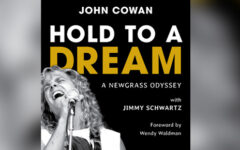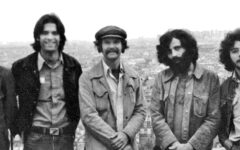
 Aaron will be a regular columnist at Bluegrass Today, and his initial offering is particularly germane to the hot topic at this year’s World Of Bluegrass.
Aaron will be a regular columnist at Bluegrass Today, and his initial offering is particularly germane to the hot topic at this year’s World Of Bluegrass.
I came to love bluegrass music on the night of November, 7, 1997 on what I recall was a rainy night in Columbus, Ohio. Bob Dylan was playing the Veteran’s Memorial Auditorium that night, and I was there alone, as none of my friends shared a sufficient enthusiasm for the Bard of Minnesota and his rough-hewn voice.
He sang Maggie’s Farm, Tangled Up in Blue, and Like a Rolling Stone that night, all favorites of mine, but it was a song I’d never heard before that poleaxed me. Reaching down into the bag of American song that he’s undoubtedly studied more than most, Dylan sang I’ll Not Be a Stranger, a song recorded by the Stanley Brothers and last released on The Early Starday/King Years: 1958-1961, though I had no idea of any of those facts at the time.
For a few minutes, the hippies in the crowd stopped hopping, the girl in the long, flowery skirt stopped twirling like a top, and I stood there marveling at the spectacle of a 1960s counterculture icon playing an unreconstructed country gospel song for an audience composed of rich baby boomers and pot-smoking college students.
The plainly hopeful lyrics and the apparent conviction with which Dylan delivered them sent me later that night to the Internet, still a new resource for me at the time. There I found out about Carter and Ralph, and that sent me to the CD racks of my local library and to the music collection of a friend of mine who had previously tried to sell me on bluegrass music.
I loved the Stanleys, and loved even more the harder-edged sounds of Bill Monroe. I started turning on the radio every Saturday night to hear Bluegrass Breakdown, a four-hour show hosted by Steve Allen, on WYSO public radio in Yellow Springs, Ohio, where I discovered new favorites like Blue Highway and that incomparable Del McCoury Band.
Bluegrass music had totally conquered me. I begged, borrowed, and bought as many CDs as I could. I soaked up every bit of history I could from Allen (a walking encyclopedia of all things Monroe) and from the late, legendary Moon Mullins, who was broadcasting then on WBZI in neighboring Xenia, Ohio. I consumed Robert Cantwell’s Bluegrass Breakdown and Neil Rosenberg’s Bluegrass: A History. And by a happy series of circumstances, I ended up replacing Allen as the regular host of Bluegrass Breakdown when he stepped down in late 1999.
During my tenure as host of the show, which ran to the summer of 2003, I learned a lot about the different standards of artistry and professionalism that exist in the bluegrass music world, and that egos and feelings can be hurt easily when those differing standards collide.
“There’s nothing better than good bluegrass; there’s nothing worse than bad bluegrass,” the host of the folk and Americana program that preceded Breakdown told me. He was warning me not to let those with call-in requests run the show. The regulars would ask for the same songs each week—often cuts done by their uncle’s regional band, or something by one of the not-so-accomplished pickers who haunted Dayton’s bluegrass bars in the 1950s and 1960s—but I should keep the wider audience in mind.
I made some people mad by refusing to play certain songs that I considered to be ill-performed, badly recorded or otherwise not airworthy. Dropping in one of those tracks between Alison Krauss and the Seldom Scene would make most listeners wonder why I didn’t have the same standards as other hosts on the station or elsewhere on the dial. I made another group of listeners mad when I refused to play cuts from a CD recorded by a group of young guys that had gained a following around town. The songs are good, I said, but the band wasn’t tight enough and the harmonies were pretty ragged. I told them this tactfully off-air, but they never spoke to me again.
Since I’ve been reviewing records, I’ve run up against the same thing, but with professionals—or semi-professionals—who should know better. Publicists, record company people and artists have pushed back against less-than-glowing reviews that I have written and edited. Not too long ago, a member of the team of one of the biggest names in bluegrass was shocked to see that I could not recommend an album that had received accolades from just about every other reviewer out there.
It’s fine with me when people disagree with what I write or publish. That’s what blog comments and letters-to-the-editor are for. I have even been swayed a little by a note from an impassioned fan with a good argument.
But I’ve always bristled when someone involved in producing a product for public sale or performance exhibits an attitude that they are entitled to a positive reaction. The bluegrass music world is relatively small, and we are all always debating the eternal question of what is and what isn’t bluegrass. But everyone—from the bluegrass music media, such as it is, to fans to artists and others in the bluegrass business—should start acting like we belong in the big time, because we do.
It would be a strange thing for Bob Dylan to call out the Rolling Stone reviewer who panned his latest CD, or for Wynton Marsalis’ record company to withhold promo CDs from a publication for a similar reason. Artists like that are confident in what they do, and they act like it.
In an entertainment marketplace that has more and more producers chasing fewer and fewer consumer dollars, no one is entitled to anything. You can survive a tepid review, but no amount of rosy coverage will save you if your product is not excellent. Scribblers like me will have our say, but producers who find a way to inspire fans will always have the last word.







